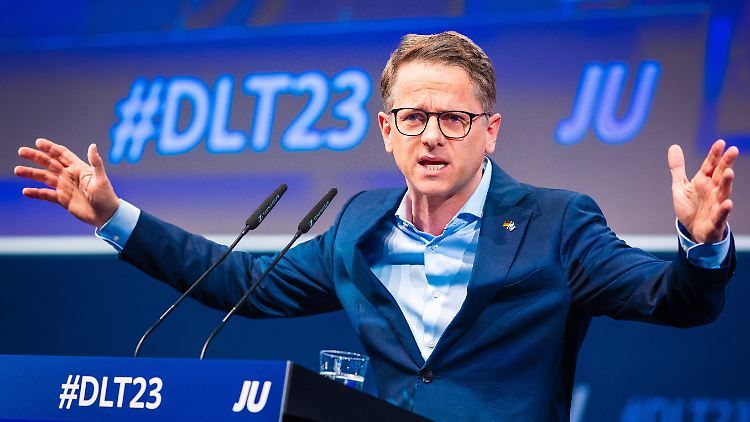While the traffic lights in Berlin are struggling to keep their composure, the Junge Union is meeting in Braunschweig for its Germany Day. Israel and migration are the dominant topics on the first evening. And suddenly everything seems so simple.
When CDU General Secretary Carsten Linnemann entered the Volkswagen hall in Braunschweig late in the evening, the Junge Union (JU) celebrated him like a pop star. Not just because of the pounding club music and the light show that starts as soon as he is spotted from the stage. JU boss Johannes Winkel tells how cheers swept through the WhatsApp groups of the youth organization of the Union parties when Linnemann was appointed general secretary. It just bursts into the presentation of the new JU advertising campaign “Time for Optimists”, which may be well received by the delegates precisely because there are so many reasons to be pessimistic – about Israel, Ukraine, migration, climate, to name just a few to mention keywords.
However, if you look at yourself, the Junge Union, but also the CDU and CSU, can be very optimistic. The Union is on the rise, has achieved convincing success in Hesse and is clearly above 30 percent in the RTL and ntv trend barometer for the first time in a long time. In the state elections in Bavaria, the result for the CSU was from the “black eye” category, but the Junge Union sees itself confirmed. “Youth are not left-wing,” is a sentence that comes up again and again on Friday evenings.
Germany Day is determined by two topics: Israel and migration. Before the welcome by Winkel, black and white photos of victims of the bloodiest attack on Jews since 1945, the Hamas murders of October 7th, are played. Winkel finds sensitive words and says that at every place there is a card with a victim’s name on it. A minute’s silence follows. The Israeli ambassador to Germany, Ron Prosor, is also expected. Instead of speaking on Friday evening as originally planned, he will only speak on Saturday.
“Conservative corrective”
In an interview with ntv.de, Winkel had already spoken out in favor of a tougher approach to migration policy. The topic has dominated the headlines for weeks. The traffic light coalition is unable to clear it. It’s not that nothing happened, but “too little, too late” probably describes the mood of many in the country. This Saturday, the “Spiegel” quotes Chancellor Olaf Scholz as saying: “We finally have to deport people on a large scale” – which sounds like a determined escape-forward, even if traffic light politicians have been advocating better-functioning deportations for a long time.
Pressure comes not only from the Union – and the AfD – but also from within our own ranks. The FDP also wants to do more against illegal migration. MP Christoph Hoffmann openly expressed his frustration on ntv.de. On Friday, Bavaria’s Prime Minister Söder diagnosed that the traffic lights were out
Such blows towards Berlin are entirely to the taste of the Junge Union. During the era of Angela Merkel, shots from the beer-soaked Germany Days often came from the direction of the Chancellery. Now, with Friedrich Merz at the helm, it is more difficult to be the “conservative corrective,” Federal Chairman Winkel admitted to journalists in Braunschweig early in the evening. But it is precisely this tradition that the young people in the Union want to maintain. Only now it’s not against your own party leadership, but against the traffic lights.
Strictly conservative, different from the AfD
Federal Chairman Winkel ensures that this is not simply pressure from the right. The 31-year-old lawyer is less of a brawler than his predecessor Tilman Kuban, and is more of a smart student type – but no less conservative in his positioning. He is ready to work with Scholz on migration – but the Union should not give in to a formulaic compromise. There has to be a real change of course. The Westphalian calls for nothing less than the abolition of the individual right to asylum, as he explained in an interview with ntv.de. He also demands that dual nationals have their German passports revoked if they make anti-Semitic comments – he leaves it open as to how this will work.
It’s not the only part of the evening that sounds like AfD. But Winkel manages to differentiate himself. He says about the right: “If they have something to say, it’s no longer against political Islam, then it’s against Muslims. Then it’s no longer about criticism of public broadcasting, then the freedom of the press is settled. ” And further: “We have to take responsibility, otherwise NATO and the EU and our reasons of state towards Israel are over.”
Later, Linnemann praises Winkel for his speech and naturally brings in Berlin’s federal political perspective. He takes up Söder’s diagnosis that the traffic light is out. He had also demanded that the Union should now enter into a coalition with the SPD as a junior partner. Linnemann rejects the idea. For him, new elections would be the better way, he says. The campaign hits are on the street, as he makes clear. In addition to limiting immigration, there is also the stopping of the heating law and the return to nuclear power. There are also Linnemann’s favorite topics such as the extensive tax-free active pension and the just-do-it mentality.
The only question that arises is who would then become a candidate for chancellor. Friedrich Merz? Or maybe Söder? Saturday will also be exciting in this respect. Then they both speak one after the other.
